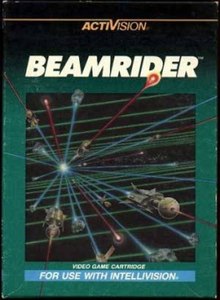Beamrider is a fixed shooter written for the Intellivision by David Rolfe and published by Activision in 1983.[2] The game was ported to the Atari 2600 (with a slightly reduced feature set), Atari 5200, Atari 8-bit computers, ColecoVision, Commodore 64, ZX Spectrum, and MSX.
| Beamrider | |
|---|---|
 Intellivision cover art | |
| Developer(s) | Action Graphics[1] Cheshire Engineering (2600)[1] |
| Publisher(s) | Activision |
| Designer(s) | David Rolfe[2] |
| Platform(s) | Intellivision, Atari 2600, Atari 5200, Atari 8-bit, ColecoVision, Commodore 64, MSX, ZX Spectrum |
| Release | Intellivision
|
| Genre(s) | Fixed shooter |
| Mode(s) | Single-player |
Gameplay
editBeamrider takes place above Earth's atmosphere, where a large alien shield called the Restrictor Shield surrounds the Earth. The player's objective is to clear the Shield's 99 sectors of alien craft while piloting the Beamrider ship. The Beamrider is equipped with a short-range laser lariat and a limited supply of torpedoes. The player is given three at the start of each sector.
To clear a sector, fifteen enemy ships must be destroyed. A "Sentinel ship" will then appear, which can be destroyed using a torpedo (if any remain) for bonus points. Some enemy ships can only be destroyed with torpedoes, and some must simply be dodged. Occasionally during a sector, "Yellow Rejuvenators" (extra lives) appear. They can be picked up for an extra ship, but if they are shot they will transform into ship-damaging debris.
Activision offered a Beamrider patch to players who could get to Sector 14 with 40,000 points and sent in a screenshot of their accomplishment.[1]
Reception
editThe Deseret News in 1984 gave the ColecoVision version of Beamrider three stars, describing it as "basically a slide-and-shoot space game."[3]
A reviewer for Your Commodore described the Commodore 64 version of the game as "a really good, wholesome arcade zapping game."[4]
See also
edit- List of Activision games: 1980–1999
- Radar Scope (1979)
- Juno First (1983)
References
edit- ^ a b c "Beamrider Atari 2600 manual". archive.org. Activision. 1983.
- ^ a b Hague, James. "The Giant List of Classic Game Programmers".
- ^ Holyoak, Craig (1984-05-30). "Here are ColecoVision's jewels". Deseret News. pp. 4 WV. Retrieved 10 January 2015.
- ^ "Your Commodore Magazine Issue 02". November 1984.
External links
edit- Beamrider at Atari Mania
- Beamrider at Atari Mania
- Beamrider at SpectrumComputing.co.uk
- Several versions of Beamrider emulated on the browser at the Internet Archive